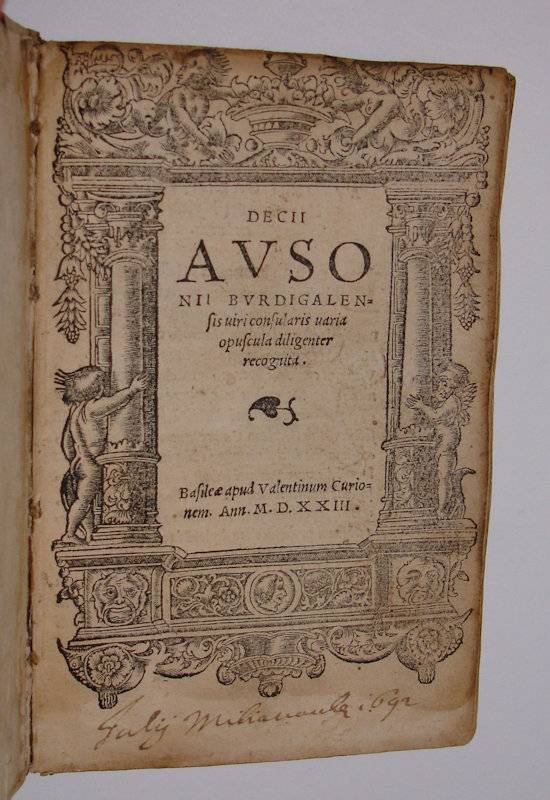AUSONIUS.
Decii Ausonii Burdigalensis viri consularis varia opuscula dilegenter recognita.
Basel (Basileae), Apud Valentinum Curionem, 1523.
8vo. (XVI),249,(3) p. Early 20th century half vellum 15.5 cm (
Ref: VD16 A 4385; Schweiger 2,21: 'nicht ohne krit. Werth'; Fabricius/Ernesti 3,147) (
Details: Title with large woodcut borders. Large printer's mark, designed by Hans Holebein, at the end; Holbein worked for Curio from 1521 till 1524. (Heitz/Bernoulli, 'Basler Büchermarken', Strassburg 1895, p. 67, illustration 102)) (
Condition: Binding probably early 20th century. Damaged back restored with a strip vellum. Title slightly soiled, and its edges are somewhat thumbed, and its upper margin is somewhat cut short. Name on the title below the imprint. First gathering slightly waterstained. No flyleaves. Paper slightly yellowing) (
Note: Decimus Magnus Ausonius of Burdigala (Bordeaux), ca. 310-394, was according to H.J. Rose an example of the senile degeneration of 4th century Latin literature, and the first glimmer heralding the full day of French literature. He wrote trifles, sometimes pretty or clever, often tiresome. (H.J. Rose, 'A History of Latin Literature', London 1967, p. 527/29). H.G. Evelyn White, the editor of the Loeb edition, is even more negative: 'As poetry (...) the great mass of his verse is negligible'. The chief value of Ausonius' work is according to him historical. (Loeb Classical Library, Ausonius, Cambr. Mass., 1919. p. VII) The 'Neue Pauly' is more positive: 'Ausonius repräsentiert eine Kultur der Bewahrung und des Erbes. Allenthalben greift er auf die griech. und lat. Lit. zurück, über die er souverän verfügt, und gestaltet anspielungs- und voraussetzungsreiche pretiöse Gebilde von formalem Raffinement'. (Der Neue Pauly, 2,334) Alexander Souter is in the Oxford Classical Dictionary full of praise: 'His numerous poems, written in various metres (...) are of considerable interest, in both subject-matter and style. There are over a hundred epigrams, some of which are in Greek and others translated from Greek. There are 25 letters. His correspondence with Paulinus of Nola is the most notable part of these. The
Ephemeris includes many poems in various metres, dealing with daily life. The
Parentalia is a collection of short poems in memory of deceased relatives of the poet. The
Commemoratio Professorum Burdigalensium is of interest for the history of education. (...) This account by no means exhausts the list of minor poems, throughout which the author's minute knowledge of Virgil is apparant and his Christian faith is not obtruded. His most important poem is the
Mosella which still attracts readers. It is a rhetorically fashioned laudatio in 483 hexameters and describes in considerable detail the various fish to be found in the river as well as some of the fine buildings on the banks and other features, the whole constituting a series of episodes, composed, like the rest of Ausonius' verse, according to rule'. (OCD 2nd ed. p. 154)
§ Not known on which edition this 1523 edition is based. It is not a reissue of the Juntae or Aldus edition, both of 1517. It has after the short biography of Ausonius by Petrus Crinitus, with which it opens, a 10 page 'Scriptorum Ausonii Catalogus'. Follow the Epigrammata, the Eidyllia, among them Mosella, Epistolae, and other minor works; it ends with Ausonius' 'Periochae in omnes Homeri Rhapsodias') (
Provenance: Name on the title is partly illegible: 'Galij Milia......, 1692') (
Collation: a-q8, r6 (leaf r6 recto blank) (Photographs on request)
Book number: 120150 Euro 900.00
Keywords: (Oude Druk), (Rare Books), Ausonius, Dichtung, Latin literature, Poesie, Spätantike, Swiss imprints, late antiquity, poetry, römische Literatur
 AUSONIUS.
AUSONIUS.

